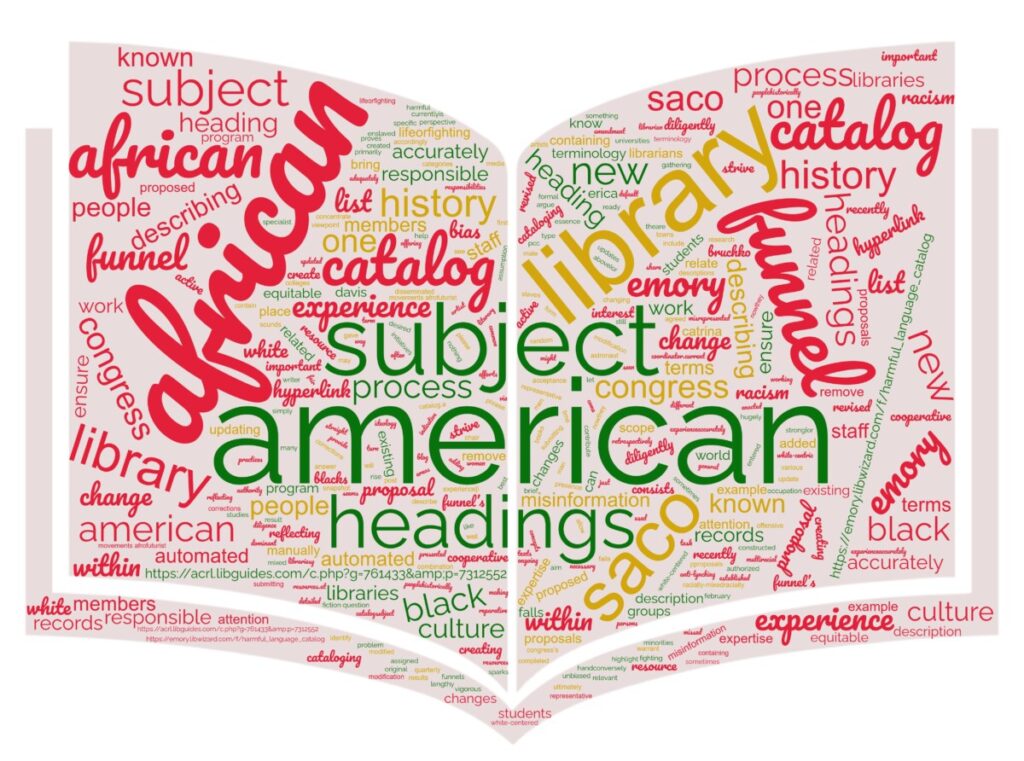Historically Black colleges and universities
Anti-lynching movements
Afrofuturist fiction
What do the above have in common?
Answer: They are new terms that have recently been added to the Library of Congress’s list of authorized subject headings. They are ready to be used accordingly when relevant resources are added to the Emory Libraries catalog.
A brief history of subject headings
Subject headings provide a description – a snapshot as it were – of the essence of a resource. These headings are not just random; in the US they primarily come from a list disseminated by the Library of Congress (LOC). One problem is that this list is indicative of the time it was created. The LOC presented the first formal offering in 1898 when a white, male perspective was dominant. Some may argue that this white-centric viewpoint is still making its presence known in 2023. It is what is sometimes known as the “straight white American man” assumption. General subject terms for categories such as occupation, which might include writer, artist, or astronaut, for example, simply default to white men. On the other hand, more detailed descriptions are constructed for groups seen to contain minorities: African American women artists is one example. This white-centered ideology fails to highlight or adequately describe many important concepts that relate to the African American experience.
Changing the subject (headings)
In 1994, the Program for Cooperative Cataloging (PCC) was established to allow members to contribute and share catalog records as well as best practices and various initiatives. This, in turn, gave rise to the Subject Authority Cooperative Program (SACO) which is responsible for submitting new subject heading proposals to the LOC. Groups within SACO—known as funnels—often concentrate on specific subject areas.
The African American SACO Funnel
The African American SACO Funnel is responsible for creating and updating subject headings related to African American culture and history. They strive to remove bias and misinformation from the library world and work diligently to bring terminology reflecting the African American experience to the attention of the LOC. The Funnel consists of librarians, staff, and students who have an interest or expertise that falls within the Funnel’s scope. Erica Bruchko and Catrina Davis from Emory Libraries are both active members of the Funnel.
Members within a SACO funnel research their proposals by gathering texts and media containing the desired term or phrase. This proves to the LOC that their proposal has what is known as “literary warrant.” While this is a lengthy process, their diligence results in a more equitable and unbiased library catalog. One such change the African American SACO Funnel has recently enacted is the modification of “Blacks” to “Black people.”
Once this type of amendment is agreed, Emory Libraries has an automated process in place to ensure that existing records containing the original heading are updated. Revised subject headings will be assigned manually for any new resources.
Current proposals that the African American SACO Funnel is working on are:
1. Slaves – proposed change to Enslaved persons
2. Racially mixed people – proposed change to Multiracial people
3. Black towns – new heading proposal
This is hugely important work and an ongoing process. Ultimately, the aim is to create a fair, equitable, and representative library catalog. You can help us with this task. If you see something in the catalog that seems offensive, harmful, or misrepresented, please let us know via this form.
—Tara Kunesh, Woodruff Library Resource Description Team


One Reply to “Cataloging for change: Accurately describing the African American experience”
Comments are closed.